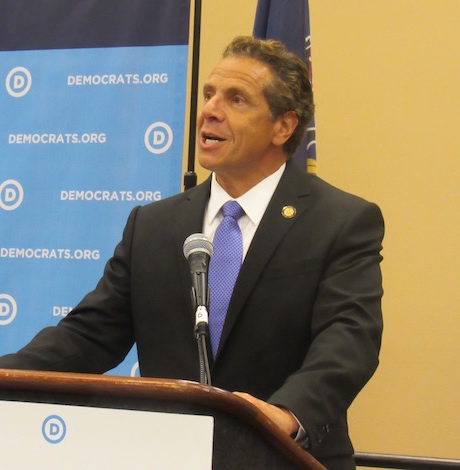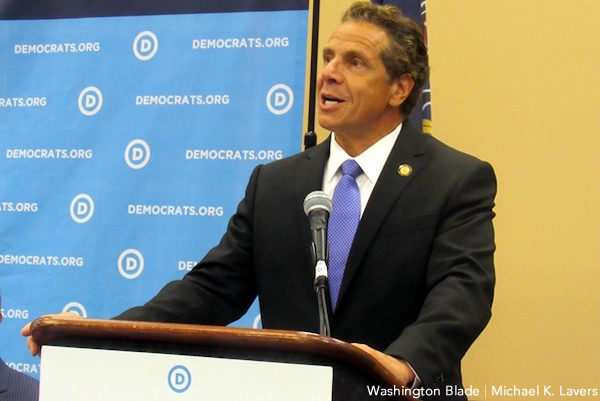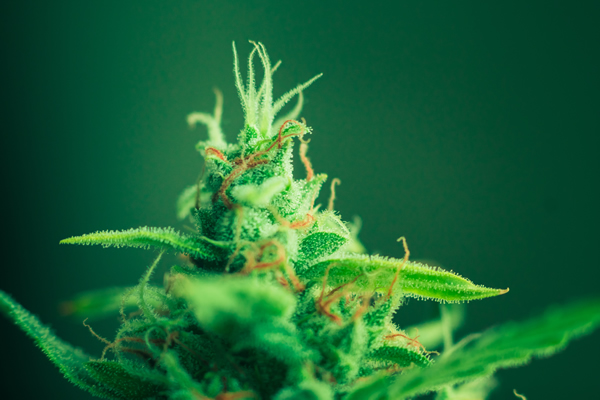Cannabis Culture
Cannabis Culture
N.Y. guv signs bill reducing possession penalties


N.Y. guv signs bill reducing possession penalties
ALBANY, N.Y. — Democratic Gov. Andrew Cuomo has signed legislation into law amending marijuana possession penalties and establishing procedures for the automatic expungement of prior, low-level cannabis convictions.
The new law takes effect August 28.
Specifically, Assembly Bill 8420-A reduces the penalty for minor marijuana possession violations (up to one ounce) to a $50 fine. It also amends penalties for offenses involving the possession of more than one ounce but less than two ounces of cannabis from a criminal misdemeanor (punishable by up to three months in jail) to a non-criminal violation punishable by a $200 fine – regardless of an offender’s prior criminal history.
The new law also amends the classification of offenses involving the use or possession of marijuana in public from a criminal misdemeanor, punishable by up to 90 days in jail, to a fine-only offense. In New York City alone, police typically make tens of thousands of marijuana arrests annually under the ‘public view’ exception. Over 87 percent of those charged with the crime are either black or Latino.
Finally, A. 8420-A establishes procedures to allow for the automatic expungement of criminal records specific to crimes involving the possession of 25 grams or less of marijuana. Several hundreds of thousands of New Yorkers will be eligible for expungement under the plan.
“Communities of color have been disproportionately impacted by laws governing marijuana for far too long, and today we are ending this injustice once and for all,” Cuomo said. “By providing individuals who have suffered the consequences of an unfair marijuana conviction with a path to have their records expunged and by reducing draconian penalties, we are taking a critical step forward in addressing a broken and discriminatory criminal justice process.”
Assembly Bill 8420-A was negotiated in the closing days of the 2019 legislative session after lawmakers failed to agree on provisions of a marijuana legalization measure.
U.S. approves increased use of cannabis in research
Federal officials have approved plans for the University of Mississippi to grow 2,000 kilograms (4,409 pounds) of cannabis to provide to investigators for clinical trial research, according to the Associated Press. Since 1968, the University of Mississippi farm, which is governed by the U.S. National Institute on Drug Abuse, has held the only available federal license to legally cultivate cannabis for FDA-approved research in the United States.
According to the AP, marijuana crops will include plants of varying THC and CBD potencies, including strains high in cannabidiol. According to the program’s current marijuana menu, no available samples contain more than seven percent THC and all samples contain less than one percent CBD.
Investigators wishing to conduct FDA-approved clinical trials on cannabis have long complained that federally provided samples are of inferior quality. A research analysis published earlier this year reported that the strains currently available from NIDA shared genetics typically associated with industrial hemp, not commercially available cannabis.
The crop will be the largest grown by the University of Mississippi in several years.
Adolescent pot use not linked to adult brain changes
TEMPE, Ariz. — The use of cannabis during adolescence is not associated with structural brain differences in adulthood, according to longitudinal data published in the journal Drug and Alcohol Dependence.
Investigators from Arizona State University and the University of Pittsburgh assessed the impact of adolescent cannabis exposure on brain morphology in adulthood. Researchers tracked differing adolescent use patterns – from no cannabis use (defined as four days of use or less) to heavy use (defined as, on average, 782 days of use) – in a cohort of 1,000 teenage boys. A subset of participants subsequently underwent structural brain imaging in adulthood (between the ages of 30 to 36). Scientists examined 14 brain regions of interest, including the amygdala and the hippocampus.
Authors reported, “We found that adolescent cannabis use was not associated with adult brain structure in a sample of boys followed prospectively to adulthood.”
They added: “Boys were classified into one of four prototypical adolescent cannabis trajectory subgroups based on prospective assessments of cannabis use frequency from age 13–19: infrequent use/no use, desisting use, escalating use, or chronic-relatively frequent use. … We found no differences in adult brain structure for boys in the different adolescent cannabis trajectory subgroups. Even boys with the highest level of cannabis exposure in adolescence showed subcortical brain volumes and cortical brain volumes and thickness in adulthood that were similar to boys with almost no exposure to cannabis throughout adolescence.”
They concluded, “[T]he patterns of cannabis use typically seen in community-dwelling adolescents does not appear to have lasting effects on brain structure.”
Cannabis Culture news in the Blade is provided in partnership with NORML. Visit norml.org for more information.

Democratic Gov. Michelle Lujan Grisham earlier this month signed two separate measures into law amending the state’s marijuana policies. The first measure (House Bill 2) legalizes and regulates marijuana possession, production, and sales for adults. The second measure (Senate Bill 2) facilitates the automatic review and expungement of the records of those convicted of low-level marijuana offenses.
Lawmakers approved both bills during a special legislative session demanded by Gov. Lujan Grisham, who had been a vocal proponent of the reforms.
NORML State Policies Manager Carly Wolf said: “This is a day to celebrate! New Mexico will greatly benefit from this new revenue stream and the creation of thousands of jobs. Most notably though, legalization will spare thousands of otherwise law-abiding residents from arrest and a criminal record, and the state’s new expungement law will help provide relief to many who are suffering from the stigma and other collateral consequences associated with a prior marijuana conviction.”
The adult-use measure (House Bill 2) permits those ages 21 and older to legally purchase up to two ounces of marijuana and/or up to 16 grams of cannabis extract from licensed retailers. It also permits adults to home-cultivate up to six mature plants for their own personal use. Retail sales would begin by April 2022.
The expungement measure (Senate Bill 2) stipulates that those with past convictions for offenses made legal under this act are eligible for automatic expungement of their records. Those currently incarcerated for such offenses are eligible for a dismissal of their sentence. It’s estimated that over 150,000 New Mexico residents are eligible for automatic expungement under this measure, according to the Department of Public Safety.
Cannabis Culture news in the Blade is provided in partnership with NORML. Visit norml.org for more information.
Cannabis Culture
Delaware cannabis activists take on corporate marijuana
Criticism from medical marijuana operators claimed that HB150 offers too many cultivation and retail licenses

As the country moves forward with sweeping changes in cannabis policy reform, locals in Delaware are tangling with corporate, multi-state medical marijuana permit holders to pass a bill for full legalization.
Adult-use activists and registered medical patients were stunned to hear opposing testimony from Delaware’s medical marijuana operators. Patients already deal with limited access and costly products. Now, many see the established industry voicing opposition as simply obstructing the progress of adult-use legislation. In response, some patients are now staging a boycott of the regulated dispensaries.
During the first committee hearing for HB150, Delaware’s adult-use bill, four of the state’s six currently licensed, multi-million dollar medical cannabis facilities offered negative testimony.
Zoë Patchell, executive director of Delaware CAN responded: “This market belongs to the long-time consumers, patients, and activists. We create the demand, we’ve been the ones driving the reform efforts, and we pay the prices at dispensaries. Cannabis is more than a market – cannabis is a community. These companies cannot reasonably fathom that we are going to purchase cannabis from any entity that has proven to put profits over patients. And now they seem willing to put consumers’ lives and freedom at risk just to hold out for an unfair advantage in the industry.”
These included publicly traded Columbia Care, “Fresh Delaware” aka CCRI, CannTech Research Inc., and the owner of EZY Venture aka “The Farm.”
They all went on record condemning HB150, and pushing a false narrative about oversupply. The core demand from the permit cartel was some protection for their private business interests with guaranteed adult-use licenses.
Criticism from the medical marijuana operators claimed that HB150 offers too many new cultivation and retail licenses, underlined by deep yet unfounded fears that the new competition would put their companies out of business.
Patchell noted, “We are not going to sit back while multi-state corporate entities, that already monopolize East Coast medical markets, work to undermine our social equity and micro-license provisions.”
Cannabis Culture news in the Blade is provided in partnership with NORML. Visit norml.org for more information.
Cannabis Culture
Virginia marijuana legalization takes effect July 1
Adult possession of cannabis up to one ounce without penalty

Following legislative approval of Democratic Gov. Ralph Northam’s amendments to Senate Bill 1406 and House Bill 2312, Virginia became the first southern state to legalize the possession and use of marijuana by adults.
Senate Bill 1406, introduced by Sen. Adam Ebbin (D-30) and Senate President Pro Tempore Senator Louise Lucas (D-18), and House Bill 2312, patroned by House Majority Leader Delegate Charniele Herring (D-46), establish a statutory timeline for the legalization of the commercial marijuana market in Virginia. The measure also permits for the personal possession and cultivation of cannabis by those ages 21 or older.
Last week, Gov. Northam recommended changes to the legislation to permit the personal use provisions of the law to take effect on July 1, 2021 rather than on January 1, 2024, the enactment date initially approved by lawmakers. A majority of the legislature concurred with that change.
Therefore, beginning July 1, 2021, adults will be permitted to possess up to one ounce of marijuana and to cultivate up to four cannabis plants per household without penalty.
The timeline by which state regulators have to enact provisions licensing commercial cannabis production and sales remains July 1, 2024.
Commenting on final passage, NORML Development Director Jenn Michelle Pedini, who also serves as executive director of Virginia NORML, said: “This is an incredible victory for Virginia. Legalization will bring an end to the thousands of low-level marijuana infractions occurring annually in the Commonwealth — ending a discriminatory practice that far too often targets Virginians who are young, poor, and people of color.”
Majority Leader Charniele Herring added: “It is a huge day for equity in the Commonwealth. Virginia is now the first state in the South to legalize recreational marijuana use, and I am so proud to have been able to carry this monumental legislation.”
Sen. Ebbin said, “The passage of SB1406 caps off years of struggle to reform our broken and outdated marijuana laws and begins the deliberate steps to repeal the harms of the failed prohibition. I am thankful to NORML, the governor, and my colleagues for moving this 283 bill from inception to passage over the last four months, and look forward to continuing to partner with them to establish a regulated, equity focused, adult-use marketplace in the coming years.”
Newly released statewide polling data finds that 68 percent of registered voters in Virginia, including majorities of Democrats and Republicans, support legalizing marijuana for adults.
Additional amendments added by Gov. Northam will allow the sealing of records related to crimes involving the misdemeanor possession of marijuana with the intent to distribute. Those records will begin to be sealed starting on July 1, 2021. Separate legislation enacted in 2020 previously sealed records related to misdemeanor marijuana possession.
Records specific to the simple possession of marijuana and/or misdemeanor possession with intent to distribute records will be automatically expunged no later than 2025. Those with records specific to crimes involving the felony possession of marijuana with the intent to distribute may begin to petition the courts for an expounging of their records in 2025.
The bill also allows for the re-sentencing of individuals currently incarcerated for marijuana-related offenses. The measure permits those individuals to have a hearing before the court that originally sentenced them, with legal counsel provided for indigent individuals. However, this portion of the bill must be reenacted in 2022.
The legislation also establishes an independent agency, the Virginia Cannabis Control Authority, to oversee the establishment of regulations that will govern the adult-use market. This agency is set to convene this summer. The remainder of the 300-page bill, which details the regulatory and market structure and social equity provisions, is subject to a second review and vote by the Assembly next year.
Cannabis Culture news in the Blade is provided in partnership with NORML. Visit norml.org for more information.
-

 District of Columbia5 days ago
District of Columbia5 days agoFinal push to raise funds, fill D.C. hotels as WorldPride nears
-

 El Salvador3 days ago
El Salvador3 days agoGay Venezuelan makeup artist remains in El Salvador mega prison
-

 District of Columbia4 days ago
District of Columbia4 days agoReenactment of 1965 gay rights protest at White House set for April 17
-

 Maryland5 days ago
Maryland5 days agoFreeState Justice: Transgender activist ‘hijacked’ Moore’s Transgender Day of Visibility event












